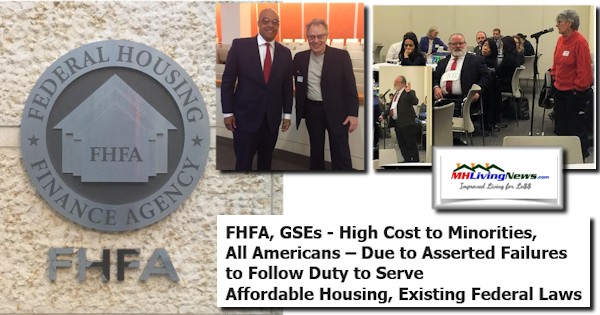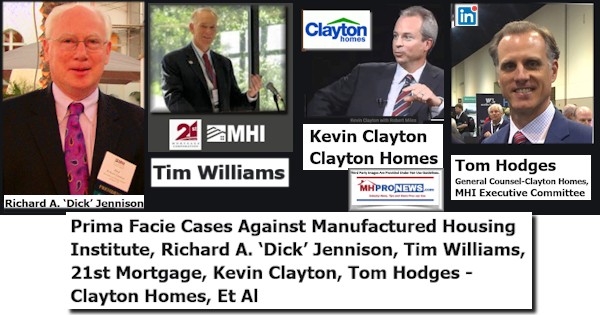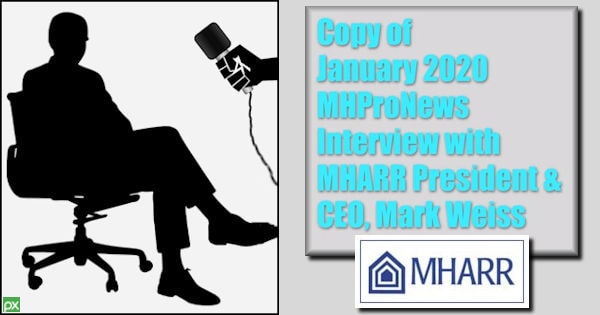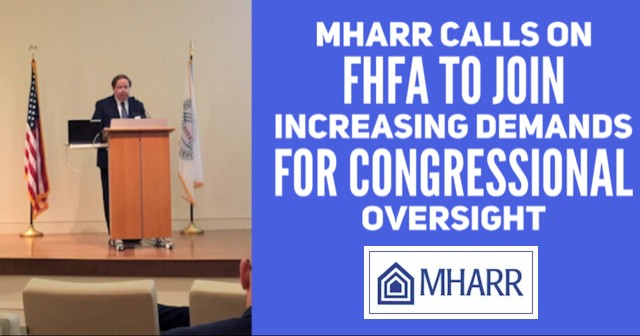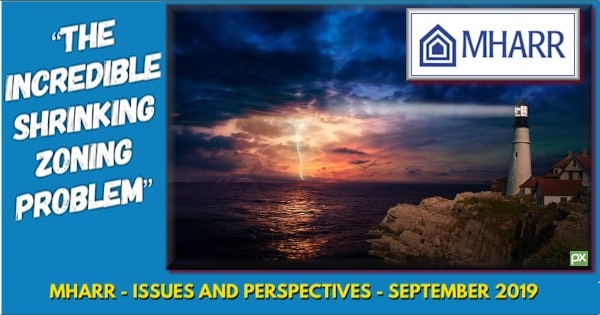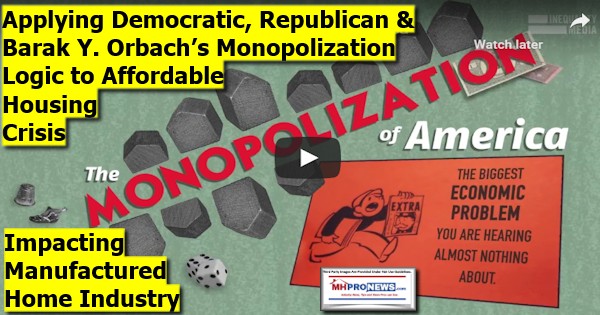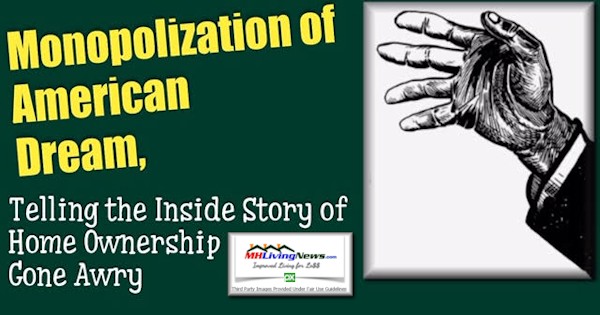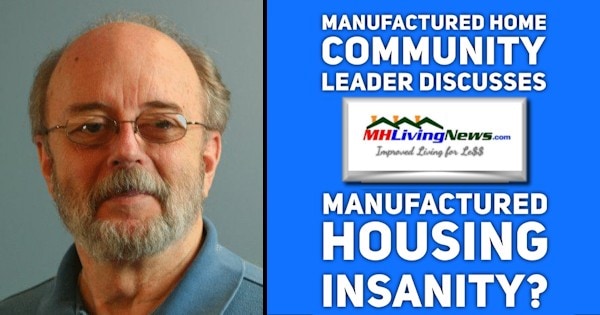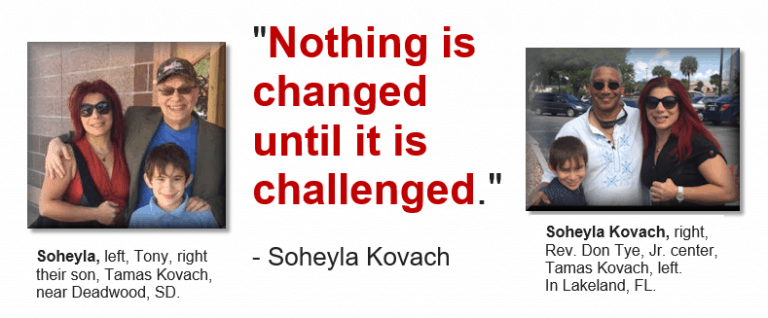
In medical school, future MDs are taught to separate emotions from facts and evidence. Similarly, attorneys, CPAs, engineers or business professionals are taught to focus on what evidence, demonstrable facts, or pertinent statements reveal about a given subject. In news, while journalists or commentators have a perspective, the best strive to ground their reporting based upon what others have said, and those third-party claims should be tested against known facts to see if the statements made were accurate.
Even that brief survey reflects how various types of professionals strive to think objectively. Reality is defined by what is. Wishful thinking isn’t the same as reality. In an era of spin, slippery deception and often treacherous lies boldly told, facts and objectivity are the solid ground that professionals ought to routinely return to for security.
With objective realities in mind, the list of mainstream news reports that follow ought to be sobering for smaller to mid-sized operations that want to do things the right ‘white hat’ principled way.
From a variety of jurisdictions, in states from border-to-border and coast-to-coast, numbers of lawmakers and public officials that include state attorneys general are among those probing “predatory,” illicit and unjust practices that in some cases violate laws by manufactured housing communities that often happen to be members of the Manufactured Housing Institute (MHI), an MHI affiliated state organization, or both.
Communities and retailers are the ‘front lines’ of the manufactured home industry. Producers, suppliers, financial services, installers, investors and other firms or interests are impacted by what occurs in these two sectors of manufactured housing.
While the screen captures that follow are not exhaustive of all the activities that relate to manufactured housing, they point to the breadth of activities that are harmful to the industry



Some of the laws that are being considered may seem to provide relief for stressed residents. It is entirely understandable that residents faced with aggressive rate hikes, or heavy-handed eviction, fines, surprising – and devastating to residents – community closures, or other tactics want prompt legal protection.
But as residents in Delaware learned after passing rent control measures some years ago, the laws they obtained didn’t quite work as they had hoped. More recently in New York, giant RHP Properties almost immediately challenged the rent control law that had just gone into effect.
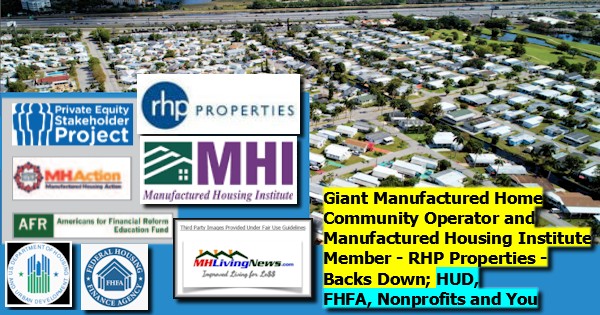
So, what did those new laws and their run up to enactment actually do? First, they brought months of negative media coverage into the minds of potential seekers of affordable housing in the form of manufactured homes.
However well-intended reports like PBS NewsHour’s Bad Bargain or the Seattle Times’ “The Mobile Home Trap” may have been for raising awareness of the various and all-too-real issues, they also corresponded with a decrease in interest by shoppers for manufactured homes. Who says so? How about data uncovered in research performed by third-party by Zillow? It revealed that interest in manufactured housing declined during the two-year snapshot that the report below reflected.
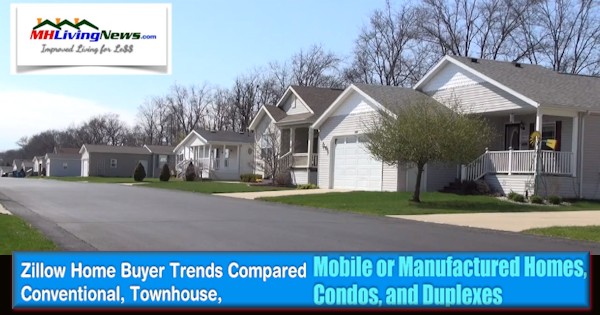
These are facts that ought not be ignored by forward-looking professionals or their investors.
Despite big claims by the Manufactured Housing Institute (MHI) as to how many millions were being exposed to their messages about manufactured homes and community living, if those postured efforts had a notable impact, it certainly isn’t found in production/shipments or Zillow’s shoppers survey results.

Put differently, MHI makes hot air claims that their critics say are exposed and popped as easily as a pin ruptures a balloon. The only thing that must be done is to look at objective data-points. It is the data – facts and evidence – that belies the claims that MHI and their surrogates are making.
Indeed, even pro-MHI personalities have admitted to mainstream media that the pushback against manufactured housing has grown significantly worse recently. Ponder what Mary Gaiski, Executive Director of the Pennsylvania Manufactured Housing Association (PMHA), told mainstream media just days ago.
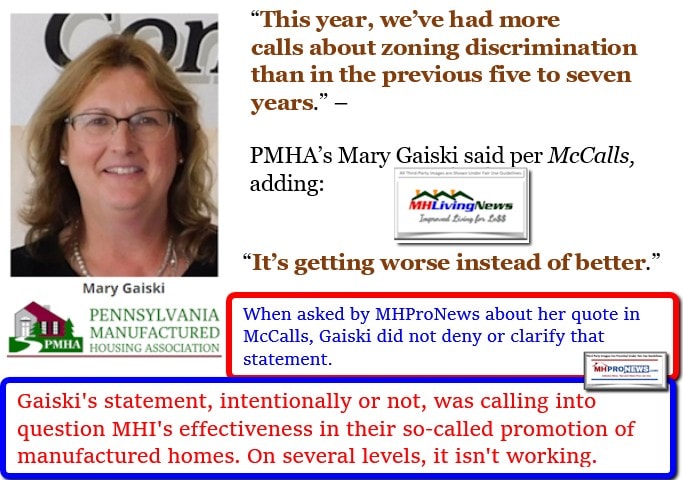
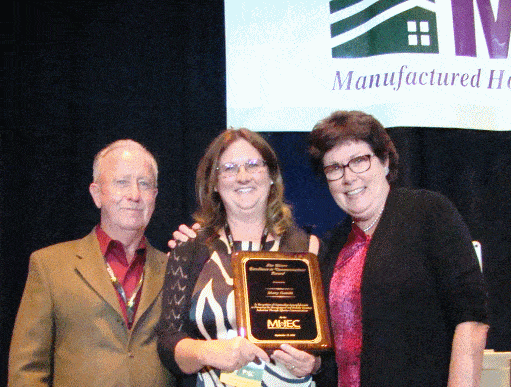
What Gaiski said wasn’t new. Manufactured Home Living News (MHLivingNews) reported on that troubling trend of manufactured housing being increasingly marginalized years ago.
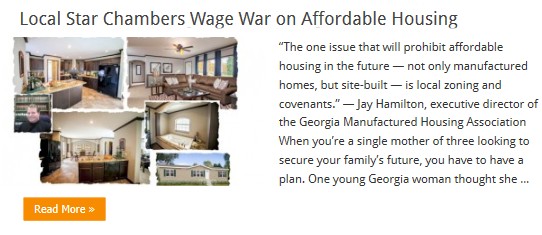
MHProNews – on the professional side of industry media – has essentially been alone in spotlighting such issues. It is as if the bloggers and remaining e-pubs or print publishers pretend that these issues don’t exist, or spin it in a manner that seems to pin the blame on others than those actually responsible for the problems. To MHR publisher Kurt Kelley’s credit, he publicly admitted as much. But others in the industry – see examples linked here, here or here – posture otherwise.
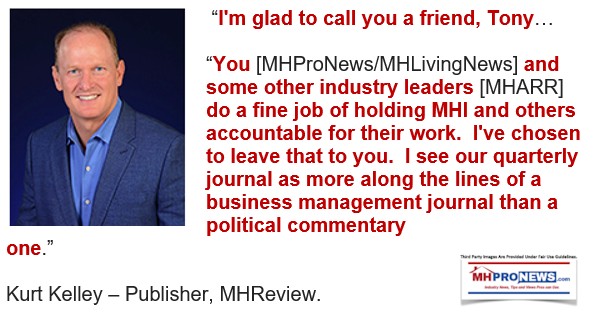
Even though MHI has told their members in emails about the coming wonders of their so-called ‘new class of homes’ projects now called “CrossModTM homes” – and while numbers of MHI-affiliated state associations pass along emailed MHI propaganda, err, ‘news and updates’ to their members uncritically. That passive and uncritical forwarding of MHI claims is on the surface a type of attempted validation. Yet, the early results on CrossModTM homes ought to be admitted as being dismal. Who makes that point using objective data? Sources who made public the fact at the FHFA St Louis listening session last November, 2019 that only 10 such homes were financed in all of 2018 and to that point in 2019. Almost 2 years, only 10 closed loans? How did that benefit the majority of manufactured home owners or the industry’s independents?
That dismal outcome begs the question. If MHI paid ‘researchers’ and ‘focus groups’ did objective work, why is it that neither the six-figure Ducker research nor the focus groups’ results are being proven by marketplace results?
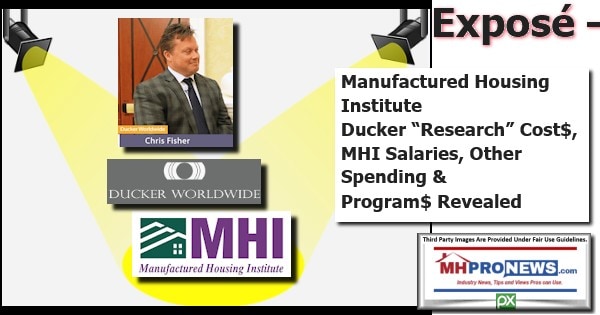

What might be even more troubling is this. The results are so poor on “CrossModTM homes” that the FHFA agreed to allow Fannie Mae and Freddie Mac to pare back their already paltry Duty to Serve (DTS) commitments. Where was that reported by anyone other than MHProNews or MHLivingNews in the industry’s other trade media? Or when a certain blogger raises such issues, why do they somehow spin it as if that person’s so-called solution is actually near the heart of the cause of the problems?
Where was it reported by MHI in their self-described ‘news and updates’ that those photo opportunities and videos with high ranking public officials netted nothing of measurable value when it came to DTS, or the enforcement of the “enhanced preemption” provisions of the Manufactured Housing Improvement Act of 2000?
These issues and those headlines above are subtly interwoven. The Manufactured Housing Association for Regulatory Reform (MHARR) not only worked for the passage of the MHIA and DTS, but they have consistently sounded the alarm when MHI began to effectively drift away from their prior commitments to those laws.
When one goes back to the PBS “Bad Bargain” and the Seattle Times “Mobile Home Trap,” what are common threads in both of those mainstream news reports? Berkshire Hathaway owned brands and operations that have ties to the Manufactured Housing Institute and/or their state affiliates. The sad fact that others in MHVille trade publishing or bloggers fail to properly make those same connections is a failure of those competing outlets to inform their readers.
Not to be Missed…
What is easily missed by outsiders looking briefly in, or even from industry professionals – who due to day-by-day business demands – might not think in the arguably problematic fashion that vulture capitalists do. Because honest, ethical free enterprise and vulture, crony capitalism are two distinct things. The dishonest can take advantage of the honest in part precisely because they deceptive use dark tactics that the honest may never imagine or suspect.
For operations such as Impact Communities, operated by MHI members Frank Rolfe and Dave Reynolds, bad news can arguably be a form of marketing. Imagine that among the millions who have heard about the controversial methods of ‘Frank and Dave’ have attracted regional, national and international media attention. Behave in aggressive ways, say outlandish things, and some investors will find that attractive.
Not only has controversy brought students and investors to “Mobile Home University,” but it has spawned copy-cats who want to ‘consolidate the industry’s fragmented land-lease communities’ sector.’
John Oliver’s viral video below and unpacked in the article linked below has had numerous mainstream media reports about it. Slate and Outline are among the media that have underscored the notorious claim made by Frank Rolfe that their manufactured home communities are “like a Waffle House where the customers are chained to their booths.” Of course, that will be seen as predatory by lawmakers and some state AGs.
The video above should be viewed with the details unearthed below in mind.
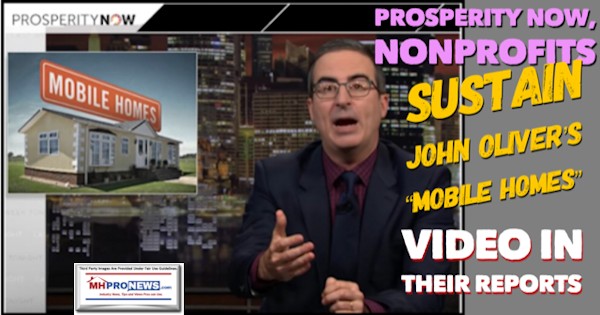
Of course such outlandish comments will draw media attention. It was perhaps intended in just that way. But the outcome is this. As Slate put it, “Every industry has its Ebenezer Scrooge.” The Outline headline reads, “John Oliver Exposes the Sinister Side of the Mobile Home Industry.” While that may be accurate enough, what impression does that leave on those who ponder or know someone who may want to live in a manufactured home or land-lease community?
Even when mainstream media works to specify that “Every industry has its Ebenezer Scrooge” – a colorful way of saying that someone should separate the wheat from the chaff – nevertheless when legislation is enacted or consumers are pondering their housing options, some of that impression tarnishes the innocent by the bad actions of the accused.
Fairness is due to manufactured home state associations leaders that feel stuck between a rock and a hard place. But at the same time, they can’t simply sit by and watch this slow and steady series of tragedies unfold. At a minimum, association executives must do whatever they can to work with media and public officials to expose the ever-more obvious patterns of what is occurring inside the industry that is enriching a few while the white hats are steadily being undermined.
It simply isn’t good enough to hide behind the instructions of leaders aligned with the Omaha-Knoxville-Arlington axis and their allies. Just as some whistleblower with clear knowledge about MHI senior staff – which suggests an MHI insider – provided tips to MHProNews, so too, state association executives and board members who truly care about the future of ethical independents have ways that they can act with honor and still not draw direct fire from the powers that be.
Whistleblower’s Documents on Lesli Gooch – Manufactured Housing Institute CEO – New Discoveries
What Do Others Say?
What are others saying about reports like this that unpack what has been occurring in manufactured housing?
On LinkedIn this weekend Patrick Kelly Donahue sounded off about an industry controversy that has been ignored by MHI and their water-carrying toadies. Donahue’s LinkedIn profile says he is a “Wood Based Materials Product and Process Expert” who has served for 29 years at Natural Resources Research Institute at UMD (University of Minnesota Duluth) as the Research Program Manager for Building Products. Rephrased, Donahue is an engaged researcher of construction methods that apparently has an interest in factory home building. In response to a report posted on LinkedIn, Donahue publicly said:
“Tony – nobody does posts like you. I found this full of interesting facts and opinions. Thanks” – here is that report.
“Tony” is our publisher, L. A. “Tony” Kovach, who replied as follows. “Patrick, thanks for the kind words, but frankly, this is a team effort here [at MHProNews/MHLivingNews]. And yes, while we do commentary, I’d stress that we strive to ground everything based upon evidence. As a Texan I know used to say, “BS talks, and facts walk.” Again, thanks. You might find this linked report of interest – it was just updated 5 minutes ago. It includes elements related to this same topic you have kindly commented on. Be well.

Some hours later, this next message came in to MHProNews about that same article linked above.
“Tony,
I just finished reading your February 16, 2020 “shortchanging-homeowners….” post.
It is an excellent collage of available information/statements, masterfully pieced together via meticulously connecting the dots and painting a picture that factually and quite accurately challenges certain recent bizarre and untimely industry news.
You are to be congratulated as the only remaining news source left in our industry who is willing to spend the tremendous amount of time that is required to prepare such a piece in order to inform and educate your readers.
Thanks,
Danny
P.S. please feel free to quote the above if you so wish.”
For newer readers, Danny Ghorbani has served manufactured housing for about 50 years. He is an engineer – a profession that relies on facts, not hot air. Ghorbani served the Manufactured Housing Institute (MHI) as a vice president back when the manufactured housing industry was far larger than it is today. He left MHI and was recruited by independent producers of HUD Code manufactured homes to start what today is known as the Manufactured Housing Association for Regulatory Reform (MHARR) as their first and longest-serving president and CEO. Ghorbani’s career involved work with developing new communities, production, suppliers and other aspects of manufactured housing. While semi-retired, he is listed as a senior advisor on that nonprofit’s website to MHARR President and CEO Mark Weiss.
While it merits a disclosure that MHARR is an advertiser and thus a client, our advertisers don’t dictate our writing or topics, so his comment doesn’t change or diminish the relevance of Ghorbani’s statement. It does take time, effort and expertise to compose a report that weaves facts together in a manner that others can double-check and then intelligently weigh for themselves.
As the saying goes, mere opinions are a dime a dozen. After all, in the opinions of Berkshire brand or MHI cheerleaders who are variously rewarded and incentivized for saying so, the industry is doing great. The problem is that the facts and evidence that manufactured housing is producing far fewer new HUD Code homes in 2019 than in 2003.
2003 was the year Buffett-led Berkshire bought Oakwood and Clayton Homes, their affiliated lending, and began his steady march to ‘grow their moat’ while the industry shrank. Are intelligent people to think that is a coincidence, or do they come to a conclusion like the published in the Financial Times by a longtime admirer of Buffett?
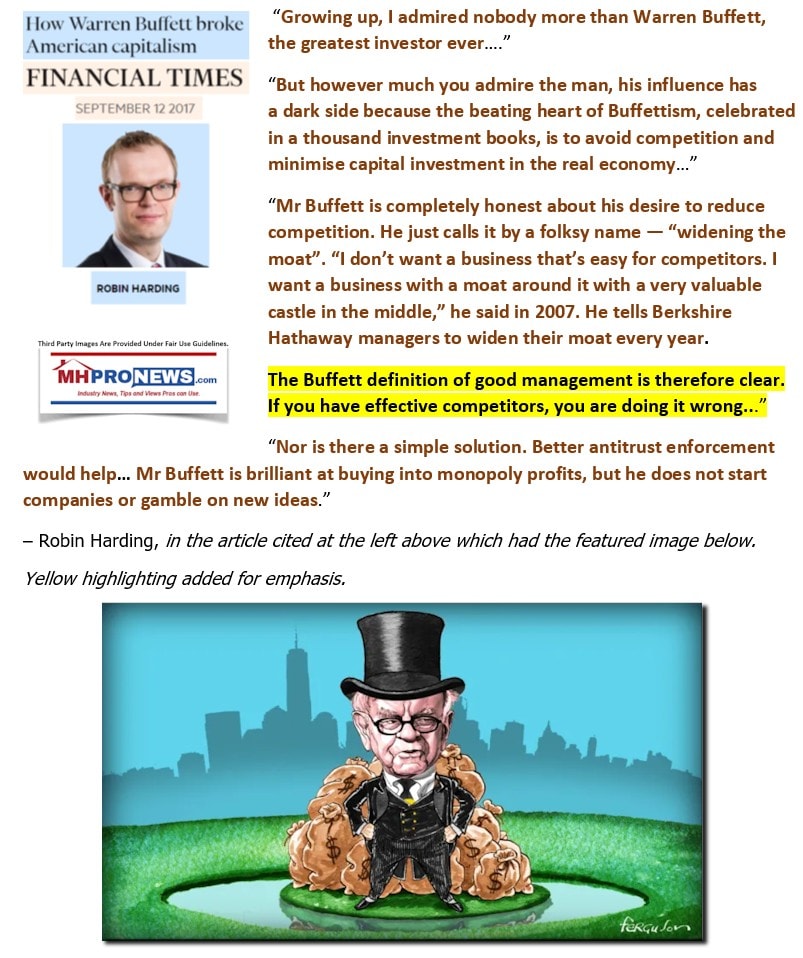
To return to the top lines in order to frame the bottom lines, here are the stark realities of the most proven form of affordable housing – the manufactured home – industry today.
- Over ten thousand manufactured housing industry business that were once successful and independent no longer exist.
- When retailers – some of which were successful for decades – where destabilized by 21st Mortgage Corporation cutting off lending to those that wouldn’t carry their repos or Clayton Homes products, tens of thousands of independently owned manufactured home communities’ business models were subsequently upended. Because those communities for decades relied on street retailers to sell the homes that went into their vacant sites.
- When thousands of “street retailers” were forced to sell out at a discounted value or were closed, and manufactured home communities also suffered, of course the independent producers of HUD Code manufactured homes were negatively impacted too.
- That in turn harmed suppliers, financial services, transporters, installers and on through the list of firms that interconnect with the front lines and producers of the manufactured home industry.
- But no less harmed are the interests of millions of owners of HUD Code manufactured homes. When lending is limited and competitors are eliminated, that is results causes residents to be ‘at the mercy’ of community operators and corporate giants who have little concern for them as individuals, as is evidenced by the mainstream news headlines shown above.
- All of this negatively impacts taxpayers, government and other conventional housing homeowners too. How so? Because Congress passed the MHIA and DTS to provide free market opportunities to create more homeowners and to support existing owners of inherently affordable manufactured homes. Local, state and federal governments are left dealing with an affordable housing crisis that predictably will grow worse when the most proven form of affordable housing is artificially being manipulated and thereby limited.
While someone can certainly do a report that focuses only on a specific scenario – as those mainstream news reports do often do, which is an entirely valid form of reporting – what this report or others like it do is put those specific reports in the context of the macro-environment that are the drivers behind those problematic local issues.
Only stopping and reversing the root causes of the problems will slow and eventually cure the symptoms.
The good news is that the laws needed to accomplish those goals already exist. The problem is that those good laws are not being properly enforced. When public officials – for whatever reasons – don’t do their jobs, there are remedies for that occurrence.
But when nonprofits that are supposed to represent the interests of thousands of manufactured housing industry independents look the other way – or worse, sell them out for weekend getaways, job security and the chance to serve the powers that be in the industry – then a different kind of probe and actions are necessary. Those nonprofits often function under state laws. Those executive directors and board members have a fiduciary responsibility to their members. A variety of ethical and legal issues arise from the weaponization or neutering of manufactured housing trade groups. That said, as noted above, those that feel stuck in the squeeze do have a variety of ways to appear to play along while working to stop the corruption of the industry from within.
What this report has sought to outline – based upon the evidence – is this. Solutions to those varied and interconnected challenges exist. But it starts with understanding the facts, trends and making sound decisions based upon evidence not spin-based opinions. That should lead to intelligent action that aims to correct what has gone wrong in manufactured housing.
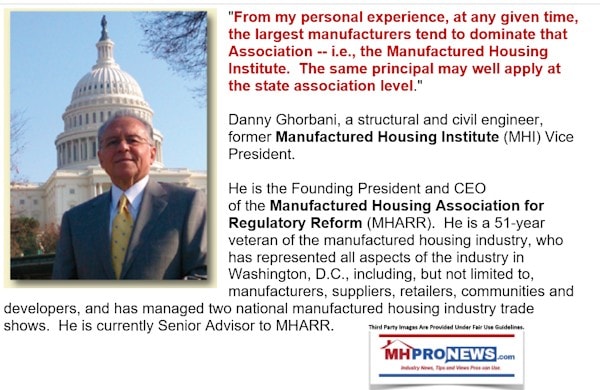
There are times that state or federal officials can and have acted in ways that not only enforce the law on deviant behavior, but do so in a manner that may recover some damages for those who were harmed. So while a state AG may not be allowed to help a single individual, when a group is involved, a different scenario emerges. There are federal parallels to that point. One example is when the Federal Trade Commission (FTC) announced on July 22, 2019 a settlement with Equifax worth some $575 million to those harmed.
The harm done by brands associated with Berkshire Hathaway in manufactured housing is arguably in the tens of billions of dollars, if not higher. The good news is that CNBC reported that Berkshire has about $128 billion in liquid assets, as Buffett seeks an “elephant sized” acquisition.
Buffett’s brands logically aren’t solely responsible for what has gone wrong in manufactured housing, but the case can be made that they are at or near the nexus for the harm done, which includes the weaponization or neutralization of scores of nonprofits involved in manufactured housing.

There is an alternative hypothesis someone could advance to the fact-laced evidence above. It would be this. Educated, successful people – who often have years of manufactured housing experience – have since 2003 inexplicably behaved in a manner that harms industry independents, numbers of consumers and just happens to help consolidators. With all of the positive evidence for manufactured housing – decades of credible, independent third-party research – is routinely ignored, not to be found on MHI’s website. But what is found are videos and promotions that they’ve paid for to praise themselves. Never mind that they evidence of their effectiveness is contradicted by MHI’s own statements.

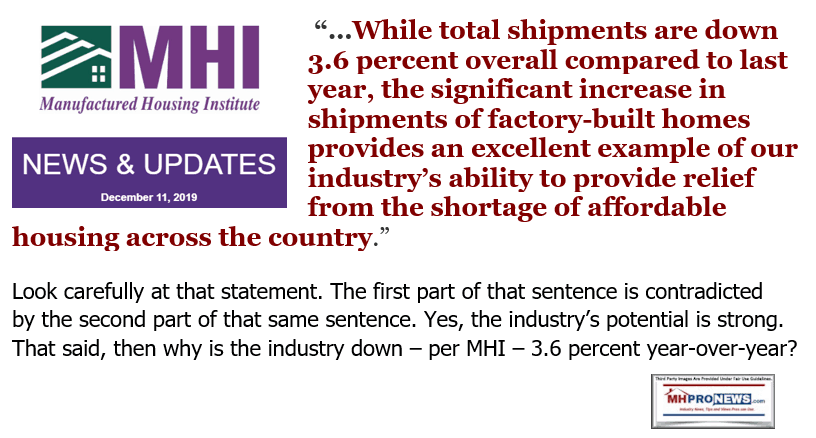
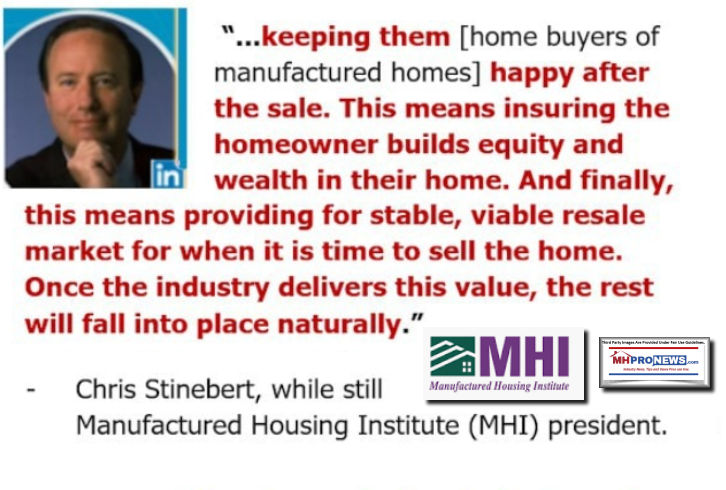
To go deeper on the related issues that are keeping manufactured housing underperforming during an affordable housing crisis, see the timely reports linked above or further below. That’s it for this report on manufactured housing “Industry News Tips and Views Pros Can Use“ © – MHVille’s runaway #1 news source, where “We Provide, You Decide.” © (News, fact-checks, analysis, and commentary.) Notice: all third party images or content are provided under fair use guidelines for media. 
Submitted by Soheyla Kovach for MHProNews.com. Soheyla is a co-founder and managing member of LifeStyle Factory Homes, LLC, the parent company to MHProNews, and MHLivingNews.com. Connect with us on LinkedIn here and here.
No Title
No Description
No Title
No Description
No Title
No Description

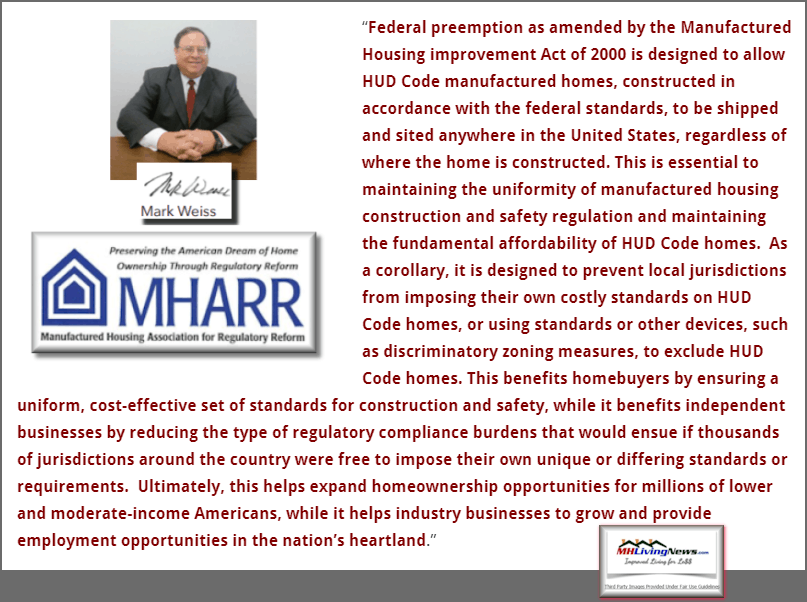
There is more than enough evidence that there is corruption, deceptive trade practices and other arguably illegal activities that are benefiting a few to the harm of the many. See the related articles below.
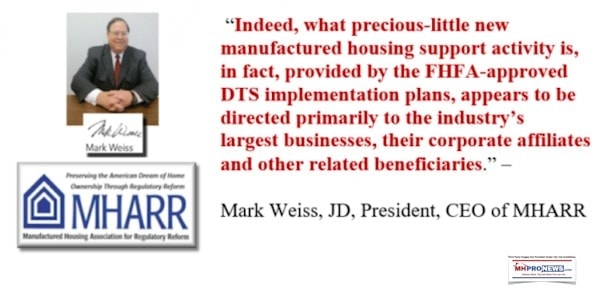
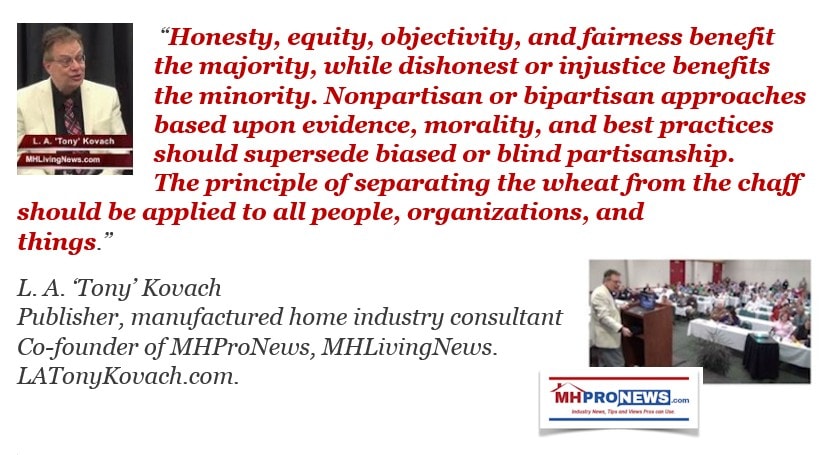
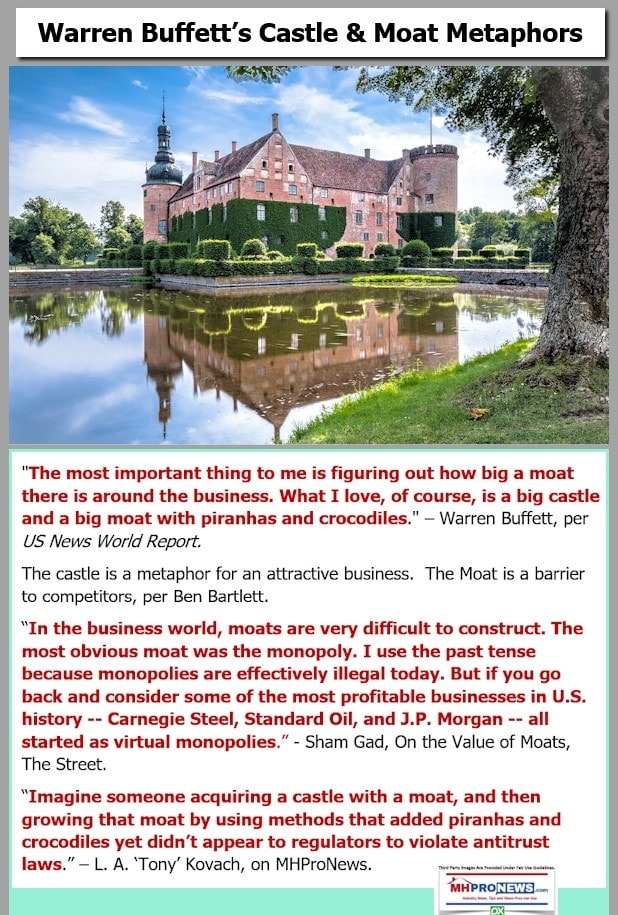
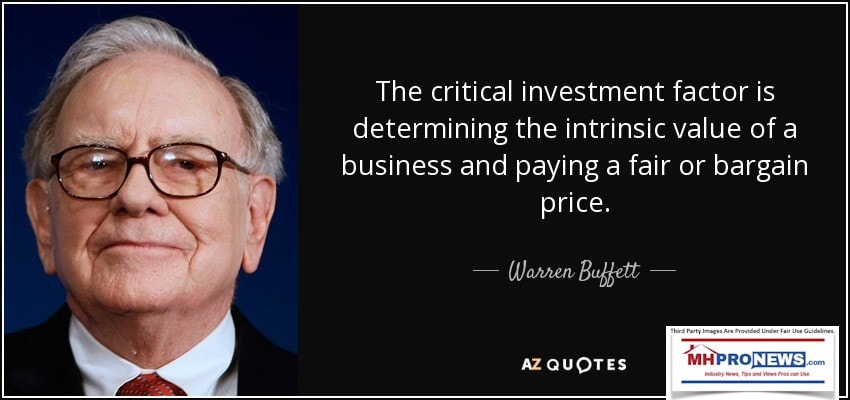
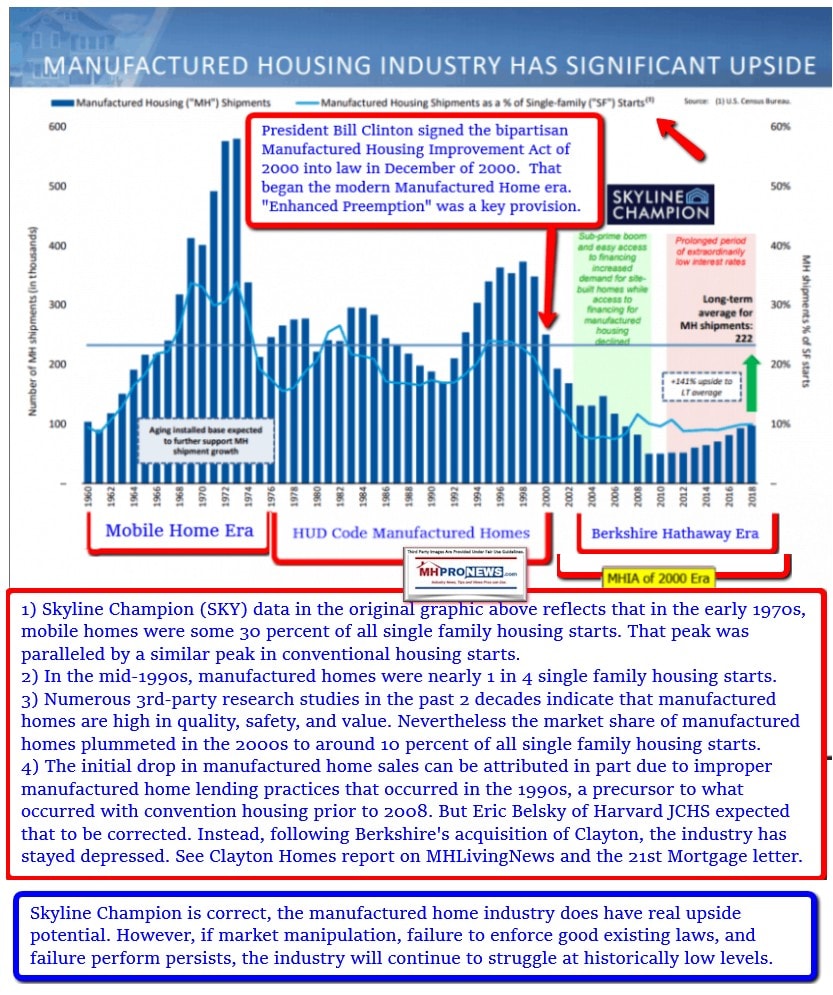
The bad news is that the opposition to ethical ‘white hat’ businesses, investors and other professionals have deep pockets and they are politically connected. But the good news is that Bernie Madoff could have once made that similar claim. Today, Madoff sits in a federal cell. It took persistence on the part of a few professionals with federal officials to finally topple Madoff’s multi-billion dollar empire.
